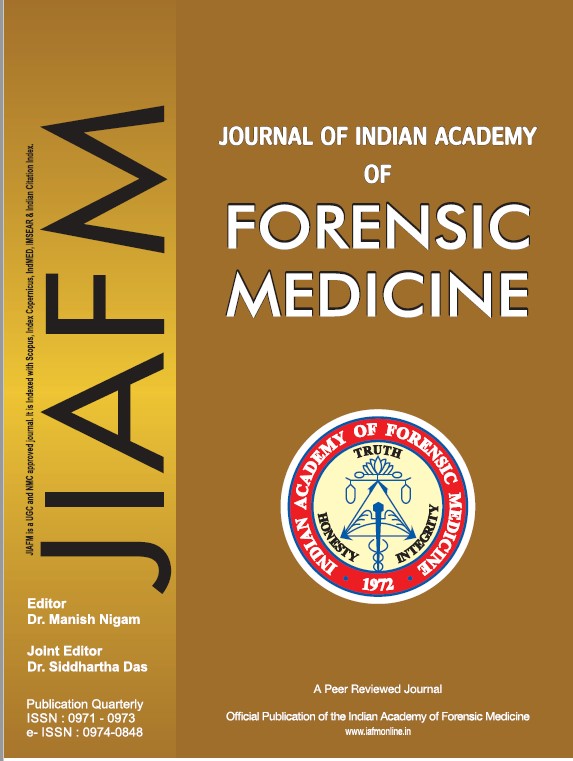Study of Perceptions toward Humanitarian Forensic: a novel - Humanly Approach
DOI:
https://doi.org/10.48165/jiafm.2024.46.2(Suppl).8Keywords:
Humanitarian, Forensics, PerceptionsAbstract
Humanitarian Forensic Action, is a concept which has been brought by the International Committee of the Red Cross (ICRC), it refers to the applicability of forensic science and technology to address the needs of the victims of catastrophes for humanitarian, rather than criminal, purposes. Most of time Forensic Medicine and science is viewed in relation to crime, offence and justice involving victims or offenders. The concept of humanitarian forensic is predominantly focussed on dignified management of victims and grieved society. Forensic and forensic approaches are not much appreciated by community. There is a widely prevailing myth in the society that forensic is about investigation, crime, postmortem etc. People avoid taking help of forensic investigations unless it is absolutely essential. We started this project with the hypothesis that there are prevailing myths in community about forensic and lack of awareness about humanitarian forensics. We have collected 100 responses randomly in hospital settings. Out of which 62 respondents were male and 28 were female. Out of 100 respondents, 55 were from age group 20-30 years and with reasonably good education status. Validated 15 statements were asked for participant to respond on the Likert scale of 1-3 (agree, partially agree to disagree).
Downloads
References
Using forensic science to care for the dead and search for the missing: In conversation with Dr Morris Tidball-Binz. International Committee of the Red Cross. [Internet]. 2019. [Cited 2019 Sep 28]. Available from: https://www.icrc.org /en/internationalreview/article/using-forensic-science-care-|
dead-and-search-missing-conversation-dr
Cordner SM, Tidball-Binz M. Humanitarian forensic action Its Origins and future. J Forsciint [Internet]. 2017; Aug:279. doi: 10.1016/j.forsciint.2017.08.11. [Cited 2019 Sep 29]. Ava il abl e from: https://www.r e s e a r chga t e .ne t/ publication/319202827_Humanitarian_forensic_action_- _Its_origins_and_future
See Cordner, Tidball-Binz. 66-67; Management of Dead Bodies after Disasters: A Field Manual for First Responders. International Committee of the Red Cross; December 1, 2015 https://www.icrc.org/en/publication/0880-management
dead-bodies-afterdisasters-field-manual-first-responders, Accessed date: 7 September 2018 Published.
Adam Rosenblatt. The Danger of a single story about forensic humanitarianism. Journal of Forensic and Legal Medicine 61 (2019); 75–77.
Reddy KSN. The Essentials of Forensic Medicine and Toxicology. 33rd edition; 2014. India: Jaypee Brothers Medical Publishers. p.26.
Guharaj PV, Gupta SK. Forensic Medicine and Toxicology. 3rd edition; 2019. India: Universities Press. p. 167.
The Conversation. (2019). Humanitarian forensic scientists trace the missing, identify the dead and comfort the living. [Internet]. 2019. [Cited 2019 Oct 1]. Available from: http://theconversation.com/humanitarian-forensic
scientists-trace-the-missing-identifythe-dead-and-comfort the-living-115623
Icrc.org. [Internet]. 2019. [Cited 2019 Sep 30]. Available from: https://www.icrc.org/en/doc/assets/files/other/ what_is_ihl.pdf
V. Bernard, Editorial, Int. Rev. Red Cross 93 (December (884)) (2011).
AccuWeather Steady Increase in Climate Related Natural Disasters, http://www.accuweather.com/en/weather-blogs /climatechange/steady-increasein-climate-rel/19974069(15 November 2013).
Explaining Extreme Events of 2014 from a Climate Perspective, Bulletin of the American Meteorological Society, https://www.ametsoc.org/ams/index.cfm/ publications/bulletin-of-the-american-meteorological society-bams/explaining-extreme-events-from-a-climate perspective/.
R.L. Loftis, Half of Weather Disasters Linked to Climate Change, National Geographic, http://news.national geographic.com/2015/11/151105-climateweather-disasters drought-storms/ (5 November 2015).
American Academy of Forensic Science, Humanitarian and Human Rights Resource Centre, http://www.aafs. org/resources/humanitarian-humanrights-resource-center/ (Accessed 7 October 2016).
Ute Hofmeistera, Susana Navarro. A psychosocial approach in humanitarian forensic action The Latin American perspective. Forensic Science International 280 (2017) 35–43.
Julia Rosenberg, Emily Edwards, Karen H. Wang, Katherine C. McKenzie, Andrea G. Asnes, Janine Young. Characteristics and scope of humanitarian relief forensic medical evaluations for immigrant children in the US. Journal of Forensic and Legal Medicine 82 (2021) 102221.


